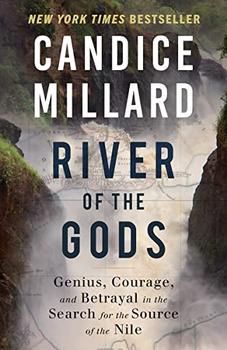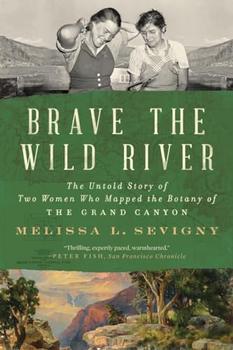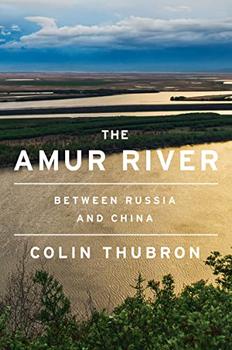Summary | Excerpt | Reviews | Beyond the book | Read-Alikes | Genres & Themes | Author Bio

Genius, Courage, and Betrayal in the Search for the Source of the Nile
by Candice MillardThe harrowing story of one of the great feats of exploration of all time and its complicated legacy - from the New York Times bestselling author of River of Doubt and Destiny of the Republic.
For millennia the location of the Nile River's headwaters was shrouded in mystery. In the 19th century, there was a frenzy of interest in ancient Egypt. At the same time, European powers sent off waves of explorations intended to map the unknown corners of the globe – and extend their colonial empires.
Richard Burton and John Hanning Speke were sent by the Royal Geographical Society to claim the prize for England. Burton spoke twenty-nine languages, and was a decorated soldier. He was also mercurial, subtle, and an iconoclastic atheist. Speke was a young aristocrat and Army officer determined to make his mark, passionate about hunting, Burton's opposite in temperament and beliefs.
From the start the two men clashed. They would endure tremendous hardships, illness, and constant setbacks. Two years in, deep in the African interior, Burton became too sick to press on, but Speke did, and claimed he found the source in a great lake that he christened Lake Victoria. When they returned to England, Speke rushed to take credit, disparaging Burton. Burton disputed his claim, and Speke launched another expedition to Africa to prove it. The two became venomous enemies, with the public siding with the more charismatic Burton, to Speke's great envy. The day before they were to publicly debate, Speke shot himself.
Yet there was a third man on both expeditions, his name obscured by imperial annals, whose exploits were even more extraordinary. This was Sidi Mubarak Bombay, who was enslaved and shipped from his home village in East Africa to India. When the man who purchased him died, he made his way into the local Sultan's army, and eventually traveled back to Africa, where he used his resourcefulness, linguistic prowess and raw courage to forge a living as a guide. Without Bombay and men like him, who led, carried, and protected the expedition, neither Englishman would have come close to the headwaters of the Nile, or perhaps even survived.
In River of the Gods Candice Millard has written another peerless story of courage and adventure, set against the backdrop of the race to exploit Africa by the colonial powers.
Millard spares no detail in describing Speke's slander, and the ruin of Burton's reputation at his former companion's hands is difficult to read, as is Speke's descent into a ceaseless rage that cost him his good name and may have contributed to his death. River of the Gods, much like Millard's previous books, is a story of courage and perseverance, but it's also a harsh look at the history of British exploration and the tragedy of pride and betrayal. Filled with stunning detail, fascinating individuals and important historical context, it's a true story that takes readers on a harrowing and unforgettable adventure...continued
Full Review
 (763 words)
(763 words)
(Reviewed by Jordan Lynch).
 Candice Millard's River of the Gods recounts the harrowing expeditions of Richard Burton and John Speke, two British explorers sent to find the source of the Nile River. Burton's name was well known before these ventures, but Speke became famous for being the first to discover the Nile's headwaters, and both men subsequently gained infamy for their public feud following their journey. However, another man played an equally pivotal role in the success of this expedition — Sidi Mubarak Bombay. Because he was African, his efforts were downplayed, and his name went largely unknown until many years later. This is the case in much of British history: recognition has been focused on the expedition leaders while the locals who guided, fed, ...
Candice Millard's River of the Gods recounts the harrowing expeditions of Richard Burton and John Speke, two British explorers sent to find the source of the Nile River. Burton's name was well known before these ventures, but Speke became famous for being the first to discover the Nile's headwaters, and both men subsequently gained infamy for their public feud following their journey. However, another man played an equally pivotal role in the success of this expedition — Sidi Mubarak Bombay. Because he was African, his efforts were downplayed, and his name went largely unknown until many years later. This is the case in much of British history: recognition has been focused on the expedition leaders while the locals who guided, fed, ...

If you liked River of the Gods, try these:

by Melissa L. Sevigny
Published 2024
The riveting tale of two pioneering botanists and their historic boat trip down the Colorado River and through the Grand Canyon.

by Colin Thubron
Published 2022
The most admired travel writer of our time - author of Shadow of the Silk Road and To a Mountain in Tibet - recounts an eye-opening, often perilous journey along a little known Far East Asian river that for over a thousand miles forms the highly contested border between Russia and China.
There is no such thing as a moral or immoral book. Books are either well written or badly written. That is all.
Click Here to find out who said this, as well as discovering other famous literary quotes!